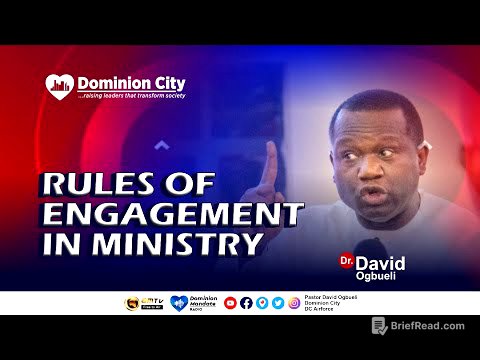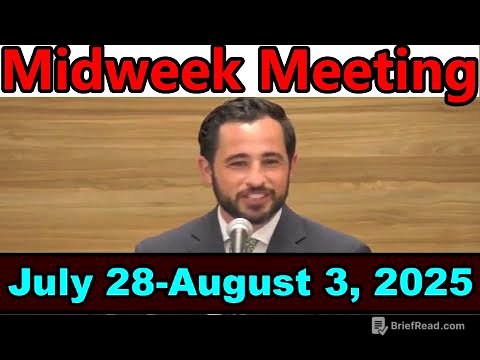TLDR;
This seminar focuses on personal development as the key to a better future. It highlights that success is attracted, not pursued, and that personal growth directly influences income and overall happiness. The seminar covers basic laws derived from the Bible, the importance of goal setting, diseases of attitude, and the power of emotions to transform one's life. It emphasises that external circumstances are less important than one's internal changes and actions.
- Personal development is key to a better future.
- Success is attracted, not pursued.
- Overcoming negative attitudes is crucial.
- Emotions can be harnessed for life change.
Introduction: The Challenge of Personal Development [0:01]
The speaker introduces the central challenge of life: to have more than you've got, you must become more than you are. He stresses that unless you change how you are, you'll always have what you've got. Income rarely exceeds personal development, and any temporary jumps in income will revert unless personal growth sustains it. True happiness isn't in what you get, but in what you become, making personal development the core subject.
Basic Laws for a Better Life [1:50]
The speaker shares that studying basic laws, primarily from the Bible, can provide ideas, stories, and success equations for a better life. He clarifies he is not a theologian but highlights the Bible's practicality alongside its spirituality. The speaker suggests that if you're unhappy with your financial situation, the Bible offers guidance for making necessary changes.
The Power of Setting Goals [2:37]
The speaker recounts how his mentor, Mr. Shoaff, emphasised the importance of goal setting. When asked for his list of goals, the speaker admitted he didn't have one, which led Mr. Shoaff to accurately guess his bank balance. Learning to set goals revolutionised the speaker's life economically, socially, and personally.
Diseases of Attitude and Their Cure [4:33]
The speaker introduces the negative aspects of life, focusing on diseases of attitude. He warns that these diseases are as detrimental as physical ailments and can destroy opportunities for success. The speaker promises to discuss how to identify, understand, and cure these attitude diseases, drawing from his personal experiences.
The Day That Turns Your Life Around [5:27]
The speaker discusses the emotions that can change your life, noting that humans are emotional creatures. Emotions are powerful for life change but can either build or destroy. He stresses the importance of intelligently managing emotions, as civilisation itself is the intelligent management of human emotions. Applying emotions correctly can lead to a transformative day.
The Major Key: You [6:18]
The speaker reveals the seminar's theme: "The major key to your better future is you." He advises writing this down and placing it where it can be seen daily as a reminder. He reflects on his earlier confusion about why some people earn significantly more than others, even when working for the same company and having similar circumstances.
Value Makes the Difference [8:35]
The speaker explains that the key difference in economic results is value. While you can't get more time, you can create more value. People are primarily paid for the value they bring to the marketplace, not just for their time. It's possible to become twice as valuable and earn twice as much in the same time if you work primarily on yourself.
Becoming an Above Average Person [11:46]
The speaker states that to develop an above-average income, you must become an above-average person. This includes developing above-average qualities like a handshake, smile, excitement, interest in others, and intensity to win. He shares Mr. Shoaff's advice: learn to work harder on yourself than you do on your job.
The Importance of Personal Change [13:08]
The speaker recounts a pivotal conversation with Mr. Shoaff, who advised that for things to change, you have to change. Before meeting Mr. Shoaff, the speaker hoped things would change, but realised that change starts with personal transformation.
The Constant Nature of Life [14:43]
The speaker asserts that life will likely remain consistent, with tides coming in and going out, and light turning to dark. He emphasizes that this consistency shouldn't be startling. The pattern of opportunity mixed with difficulty will persist, and the only way your life changes is when you change.
Four Major Lessons in Life [17:42]
The speaker introduces four major lessons in life, framed around the changing seasons. He sets this up by stating that life and business are like the changing seasons, but you cannot change the seasons, only yourself. The four lessons are: learn how to handle the winters, take advantage of the spring, protect your crops all summer, and learn how to reap in the fall without complaint.
Handling the Winters of Life [19:23]
The speaker details the first major lesson: learning to handle the winters of life, which come with regularity after the falls. Winters represent difficulty, recessions, and challenging times. He advises against wishing for easier times, but instead wishing to become better. The key is to get stronger, wiser, and better to navigate these tough times.
Taking Advantage of Spring [22:22]
The speaker explains the second lesson: learning to take advantage of the spring, which represents opportunity following winter. He stresses the importance of acting quickly during these opportunities, as they are limited. One must choose between planting in the spring or begging in the fall.
Protecting Your Crops All Summer [24:20]
The speaker discusses the third major lesson: protecting your crops all summer. He warns that all good things will be attacked, and every garden will be invaded. It's crucial to defend all values and tend to every garden throughout the summer to prevent intruders from taking what you've started.
Reaping in the Fall Without Complaint [25:49]
The speaker covers the fourth major lesson: learning to reap in the fall without complaint. This involves taking full responsibility for what happens to you, accepting both successes without apology and failures without complaint. He recounts his past tendency to blame external factors for his lack of success.
Taking Responsibility for Your Life [28:17]
The speaker shares how Mr. Shoaff pointed out that his list of reasons for not doing well didn't include himself. He learned to replace his list of excuses with the word "me," accepting personal responsibility. It's not what happens to you, but what you do about it that changes everything.
The Power of Personal Action [30:56]
The speaker stresses that anything can happen, but it's what you do about it that matters. Disappointments are common, and the difference lies in how you handle them. He encourages listeners to decide what they will do starting tomorrow to change their life's direction.
Reaching Inside for Remarkable Gifts [34:36]
The speaker advises reaching inside yourself to utilise remarkable human gifts and change anything you want to change. He challenges listeners to take action and transform their lives, emphasising that they don't have to remain the same by choice.
Three Steps to Personal Development [35:58]
The speaker outlines three steps for personal development: discipline, self-motivation, and finding out how things work. He dismisses enthusiasm alone as insufficient and highlights discipline as a major step in human progress.
The Key to Discipline: Starting Small [36:54]
The speaker emphasises the importance of discipline, starting with small disciplines that lead to bigger ones. He encourages making a list of manageable tasks and disciplining yourself to accomplish them, building the necessary "muscle" for larger challenges.
The Importance of Self-Motivation [39:07]
The speaker stresses the importance of self-motivation, noting that it's the only kind of motivation that truly works. You can't change other people; they must change themselves. He shares a lesson from his early sales career: good people are found, not trained.
Three Steps to Start Life Change [41:30]
The speaker provides three steps to initiate life change: find out how things work, which requires ideas; study, to be successful; and curiosity, to find out how to change anything. He advises capturing ideas in a journal and repeating them to allow them to take root.
The Power of Curiosity and Reading [44:20]
The speaker highlights curiosity as the best human virtue for finding out how things work, encouraging listeners to be like children in their quest for knowledge. He suggests three ways to find out how to change anything: read, read, read; learn the setup of life; and understand the laws of the universe.
Learning the Setup of Life [47:24]
The speaker stresses the importance of learning the setup of life for two reasons: to avoid getting hurt and to benefit. He notes that ignorance is not bliss but poverty and tragedy. While you don't have to like the setup, you should learn it to navigate life effectively.
The Law of Use and the Law of Sowing and Reaping [52:04]
The speaker introduces two basic laws from the Bible: the law of use (whatever you don't use, you lose) and the law of sowing and reaping (whatever you sow, you shall reap). He illustrates the law of use with the parable of the talents, emphasising that unused talents diminish.
Understanding the Law of Sowing and Reaping [57:58]
The speaker explains the law of sowing and reaping, noting that whatever you reap is what you've sown. He provides seven key points: the law is negative (sow bad, reap bad), positive (sow good, reap good), and you always reap more than you sow. He also acknowledges that you can lose, and sometimes it hails on your crop, but if you don't sow, you don't reap.
The Importance of Sowing and Avoiding Complaining [1:05:09]
The speaker stresses the importance of sowing and making the most of your time, rather than wasting it on television. He shares a story about a preacher who learned to feed the one who showed up, but not to dump the whole load on them.
The Power of Reasons and Goal Setting [1:10:19]
The speaker emphasises the power of reasons for doing well, noting that they come before answers. He shares personal and family reasons for success, recounting Andrew Carnegie's goal to spend the first half of his life accumulating money and the last half giving it away.
Nitty-Gritty Reasons and Personal Motivation [1:17:12]
The speaker shares nitty-gritty reasons that motivated him, such as not being able to afford Girl Scout cookies and dealing with a harassing debt collector. He recounts stories of friends who were motivated by others' doubts and laughter.
A Simple Formula for Goal Setting [1:26:11]
The speaker provides a simple formula for goal setting, dividing goals into long-range (dreams) and short-range (confidence builders). He categorises goals into economic, things, and personal development. He advises working on your goals, writing them down, and checking the size and kinds of goals.
The Art of Asking and Receiving [1:38:35]
The speaker shares a Bible philosophy on how to get whatever you want: ask. He provides three key points: asking is the beginning of receiving, receiving is not the problem (failure to ask is), and receiving is like the ocean (there's plenty). He advises asking with intelligence and faith.
Emotions That Can Change Your Life [1:44:53]
The speaker shares four emotions that can change your life in one day: disgust (I've had it), decision, desire (wanting it bad enough), and resolve (I will). He stresses the importance of action, noting that you must do something about how you feel.
Overcoming Attitude Diseases: Over Caution and Pessimism [1:52:58]
The speaker discusses attitude diseases, starting with over caution. He notes that while recklessness is bad, so is being too cautious. He shares that discovering that "it's all risky" changed his life. He then discusses pessimism, the deadly disease of always looking on the bad side.
The Power of Positive Thinking [1:56:58]
The speaker stresses that lives are mostly affected by the way we think things are, not the way they are. He shares that poor thinking habits keep most people poor. He advises standing guard at the door of your mind and carefully selecting what goes into your mental factory.
The Deadly Disease of Complaining [2:01:53]
The speaker concludes by discussing the deadly disease of complaining, crying, whining, and griping. He warns that indulging in this can "ace your future." He shares the story of the children of Israel, who never reached the promised land because they constantly complained. He urges listeners to be on the lookout for things that can destroy all the good they start.









